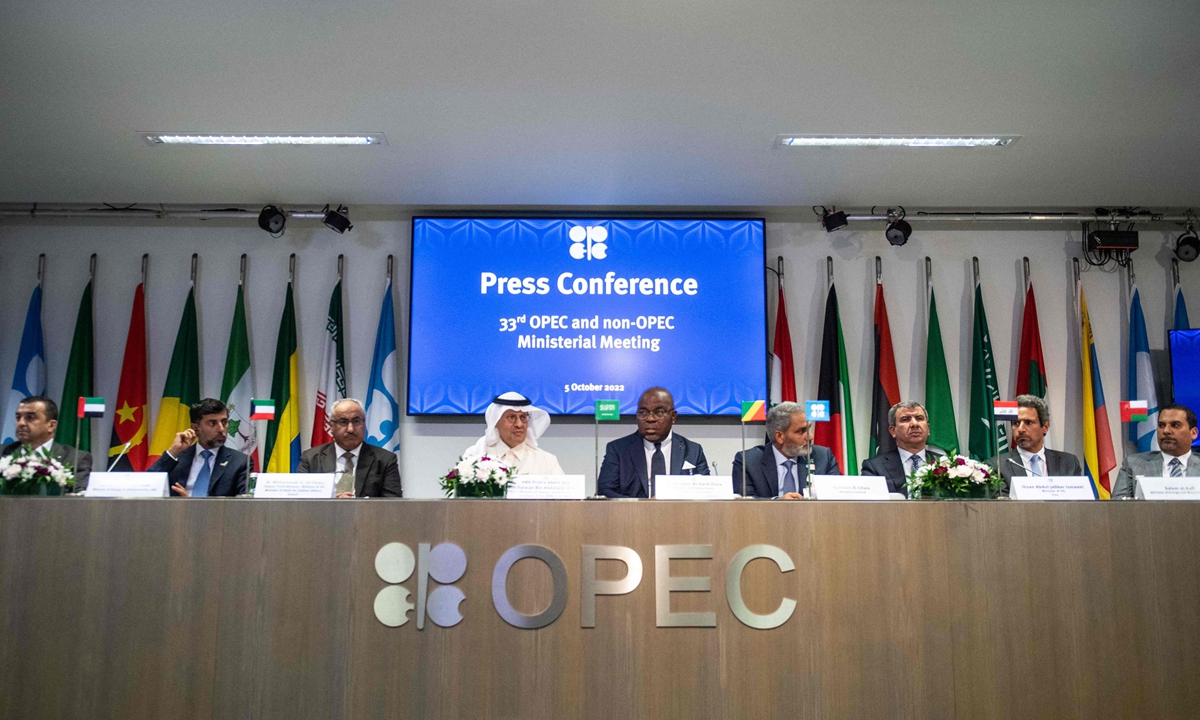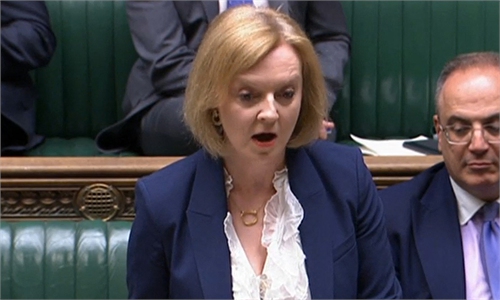
Representatives of OPEC member countries attend a press conference after the 45th Joint Ministerial Monitoring Committee and the 33rd OPEC and non-OPEC Ministerial Meeting in Vienna, Austria, on October 5, 2022.
The Organization of the Petroleum Exporting Countries (OPEC) and its non-OPEC allies' plan to cut oil output was seen as a "slap in the face" for the Biden administration which has struggled to respond with very limited options.
Chinese analysts said none of Washington's options, including releasing more oil from the Strategic Petroleum Reserve, would achieve its purpose, but more importantly, the OPEC+ cut is symbolic as more nations are not succumbing to US pressure over issues such as the Russia-Ukraine conflict.
After expressing disappointment on Thursday, US President Joe Biden said the US was looking at all possible alternatives to keep prices from rising, Reuters reported.
Some of Biden's options include releasing more oil from the Strategic Petroleum Reserve or exploring a curb on energy exports by US companies. US Secretary of State Antony Blinken said on Thursday that the US is reviewing various options regarding its relationship with Saudi Arabia, according to Reuters.
The OPEC+ announced its plans to cut oil production by two million barrels a day from November, as CNN said the cut is the largest since the beginning of the pandemic and could "lead to a dramatic spike in oil prices." The White House is "having a spasm and panicking," CNN quoted a US official as saying.
He Weiwen, a senior fellow of the Chongyang Institute for Financial Studies at the Renmin University of China and former economic and commercial counselor at Chinese Consulates General in San Francisco and New York, told the Global Times on Friday that Biden can hardly do anything effective to respond to the gas price spike.
The US has already released much of its Strategic Petroleum Reserve, and releasing the rest of it simply will not temper the price, He said.
Instead, soaring oil prices will wound Biden, who has been struggling to deal with high domestic inflation and the midterm elections, analysts said.
He said the OPEC+ cut plan annoyed Biden not just because of its domestic crisis, but also because US believes OPEC nations are helping Russia to profit from rising oil prices and mitigate sanctions imposed by the West.
But analysts said there is very little the US can do about OPEC+ nations or Saudi Arabia, and He said the US may consider more sanctions against Russia.
Lü Xiang, an expert on international relations and a research fellow at the Chinese Academy of Social Sciences, told the Global Times that US does not have the ability to impose stricter sanctions against Russia right now, after it has done almost everything it can with Russia but failed to achieve its purposes, and any further sanctions may result in the two sliding into a "war."
The US has teamed up with its allies from G7 to implement a price cap for Russian oil, however, official spokeswoman of the Russian Foreign Ministry Maria Zakharova said on Thursday that the move was a confirmation that the US and the EU are "devoid of market economic principles," and the "hands-on control and the political pressure on all economic operators," TASS reported.
Lü said the OPEC+ nations' plan was a symbolic move that they will not yield to US pressure over issues concerning Russia.
Saudi Arabia and other Middle Eastern countries are now at a stage where they have lost trust in the US, and OPEC countries will do what they want instead of doing what the US wants, Lü said, noting that the Biden administration will face more chaotic, situations after the midterms since most people predict that the Republicans may win control of the House.
This incident is another reflection of the widening cracks between OPEC members and the US, which used to be allies, as the world's major oil producers are growing increasingly impatient with the US' self-centered global strategies, analysts said.
OPEC's move came just three months after Biden visited Saudi Arabia to seek an oil production increase, and OPEC+ agreed a few weeks later to a modest 100,000-barrel increase in production, CNN reported.
Politicians from the US will only get a polite reception when they visit this region in the future, but US politicians' tricks will no longer work, Lü said.




